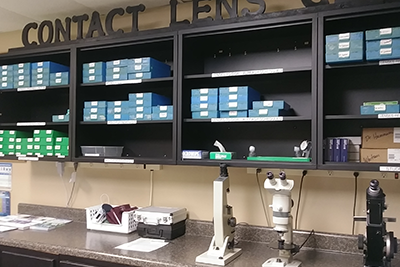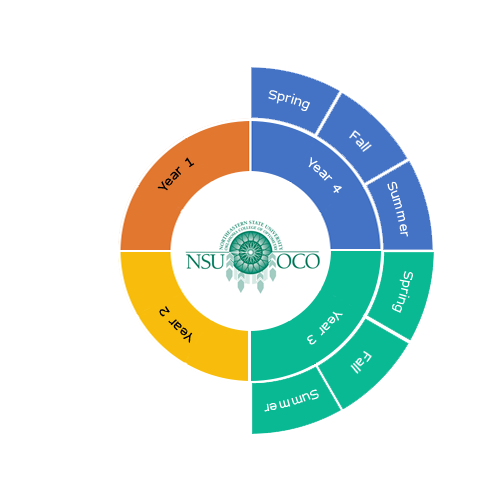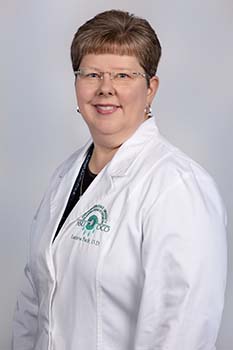Contact Lens Clinic
The Contact Lens Clinic at the NSU Oklahoma College of Optometry (NSUOCO) provides care to patients of all ages who want to wear contact lenses. Patients are primarily referred into the Contact Lens Clinic from one of the external Cherokee Nation outpatient health centers. Additionally, patients who need medically necessary contact lenses, as determined by their eye care practitioner, may be referred for contact lenses from any external practice.


Students from year III and IV of the clinical curriculum are eligible for assignment
into the Contact Lens Clinic.
Many patients prefer to wear contact lenses instead of eye glasses. Our doctors in this service area treat visual conditions such as “nearsightedness,” “farsightedness,” astigmatism, and presbyopia. A special emphasis is also placed on the diagnosis and treatment for patients with unique conditions and visual needs such as keratoconus, corneal scarring, and post-surgical complications.
Contact lenses are not cosmetic devices. They are medical devices approved by the Food and Drug Administration (FDA) which require fitting and follow-up care. Our doctors use state-of-the-art diagnostic instruments with the most modern contact lens designs to provide the best possible contact lens options for all types of visual needs. We offer an extensive inventory of contact lenses with a wide variety of products from all major contact lens brands.
Why Contact Lenses?
Contact lenses offer many advantages to glasses. There are occasions such as that
special family portrait, school pictures, weddings, or proms where we don’t want to
wear glasses. Sometimes we just want to change our eye color, play a sport or wear
safety protection that doesn't readily fit over our glasses.
Children and adults with high prescriptions in glasses often experience discomfort
due to their weight, optical distortions or inability to fully compensate for the
problem. Often contact lenses can provide a better, clearer and more comfortable alternative.
Surgical procedures that are intended to correct vision are not for everyone. They
heighten anxiety and the results are not reversible. Some patients are simply not
good surgical candidates. Contact lenses offer a safe, comfortable and reversible
alternative to refractive surgery.
Patients with medical conditions like corneal dystrophies, corneal scarring, keratoconus,
corneal transplants or those who have had previous surgeries like radial keratotomy
may only achieve their best vision through specialty contact lenses.
Types of Contact Lenses
There are over 28 million contact lens wearers in this country. Most of these wear
soft lenses that are intended to be replaced every day, every 2 weeks, or every month.
They correct virtually every type of problem: nearsighted, farsighted, astigmatism
and presbyopia.
Daily disposable contact lenses are recommended for contact lens wearers who suffer
from allergies, dryness, or simply want convenience. A fresh lens every day prevents
allergens from irritating eyes with lens reuse. Patients who notice dryness with
their current reusable lenses often experience improved comfort with daily disposable
lenses. This is primarily due to putting a new contact lens on every day. However,
contact lens solutions can contain preservatives that irritate the ocular surface,
so avoiding them with a daily disposable lens is also helpful for enhancing comfort.
The population is rapidly aging and visual demands are increasing. Manufacturers have
created highly effective soft and gas-permeable multifocal contact lenses that can
enhance the quality of life for those age 40 and above.
Orthokeratology temporarily reverses nearsightedness by sleeping in a gas-permeable contact lens every night that reshapes the cornea. Orthokeratology contact lenses, such as Corneal Refractive Therapy (CRT), are available from many contact lens companies.
Myopia, or nearsightedness, often progresses throughout childhood and when left untreated, can lead sight-threatening pathology. We have an FDA-approved contact lens option that has been proven to slow progression of near-sightedness.
Hybrid lenses are part soft and part hard. They create options for patients who may have experienced failure with other forms of contacts and/or glasses.
Scleral contact lenses or other specialty gas-permeable contact lens designs can be used to help improve vision in patients who have irregular corneal surfaces due to post-surgical complications, keratoconus, or corneal scarring.
We offer all of these contact lens options at the NSUOCO Contact Lens Clinic.
Am I a Good Candidate?
Answering this question is the most important service we provide. After a thorough
examination of your eyes, contact lens options that meet your ocular health and prescription
needs will be discussed and a lens recommendation will be made.
Meet the Clinic Chief:
Latricia Pack, O.D.
Professor
packl@nsuok.edu
918-444-4044
Profile

